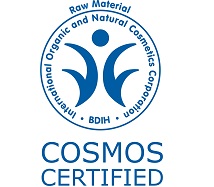

Organic Vitamin B Complex Powder
The indiscriminately use of fertilizers and pesticides in agriculture can have severe impact on human health ranging from toxicity and deadly diseases. We at ARYAN, are committed to address this challenge by working towards the organic food which uses herbal plants based extracts and adopts phytoremediation for removal of hazardous substances and toxic metals. For last two decades, our group has been involved in the production of Organic botanical extracts, organic essential oils, organic edible oil, organic spices, organic starch, organic flours, organic seeds. Now we are focusing on organic minerals and organic vitamins. By now ARYAN has carved a niche for itself in the field of ORGANIC FOODS and is continuously moving in leaps and bounds. Taking a leaf out of this growth, we intend to start the production of our “Organic Vitamin-B Complex”. Our vitamin is purely organic and does not use any chemical compounds. Unlike other organic Vitamin-B Complex available in the market, ours is totally “Gluten Free”. We have already developed the organic vitamin B complex and shortly file the patent so that commercial production can star in near future.
- The vitamin B complex consists of 12 related water-soluble substances. Eight are considered essential vitamins because they need to be included in the diet. Four are not essential because the body can synthesize them.
- Although these vitamins are chemically distinct, they are grouped together because they are found with one another in the same foods. Since they are water-soluble, most are not stored for any length of time, and must be replenished daily.
- The eight vitamins have both names and corresponding numbers. They are: B1 (thiamin),B2 (riboflavin ),B3 (niacin ),B5 (pantothenicacid ),B6 (pyridoxine ),B7 (biotin ),B9 (folic acid ),B12 (cobalamin).
- Biotin is not always included among B complex supplements. The numbers that appear to have been skipped were found to be duplicate substances or non-vitamins. The four unnumbered components of the B complex that can be synthesized by the body are choline, inositol, PABA, and lipoic acid.
- As a group, the B vitamins have a broad range of functions, including the maintenance of myelin, which is the covering of nerve cells. A breakdown of myelin can cause a large and devastating variety of neurologic symptoms.
- B vitamins are also key to producing energy from nutrients that are consumed. Three members of this group folic acid, pyridoxine, and cobalamin work together to keep homocysteine levels low. This is quite important, since high homocysteine levels are associated with heart disease .
- Some B vitamins prevent certain birth defects (including cleft palate and neural tube defects), maintain healthy red blood cells, support immune function, regulate cell growth, aid in hormone production, and may have a role in preventing certain types of cancer . They also help maintain healthy skin, hair, and nails.
B vitamins can be found in a wide variety of foods—plant and animal sources—and in foods that are fortified with the vitamins. Some foods are high in just one type of B vitamin, and others contain several of the important nutrients. Levels of some B vitamins in food are affected by excessive cooking/heating. Multivitamin supplements often contain B vitamins.
Good food sources include: Cereals, Fruits (bananas, watermelon, grapefruit),Leafy green vegetables, Legumes (beans, peas),Nuts, Potatoes, Whole grains.
The FNB(Food and Nutrition Board established an RDA for Calcium in both International Units (IUs) and micrograms (mcg).
Recommended Dietary Allowances for Vitamin B complex
| RDA/AI Men 19-50 | RDA/AI Women 19-50 | Upper Limit (UL) | |
| B Vitamin | |||
| B1 – Thiamin (mg) | 1.2 | 1.1 | Not established |
| B2 – Riboflavin (mg) | 1.3 | 1.1 | Not established |
| B3 – Niacin (mg) | 16 | 14 | 35 |
| B5 – Pantothenic acid (mg) | 5* | 5* | Not established |
| B6 – Pyridoxine (mg) | 1.3 | 1.3 | 100 |
| B7 – Biotin (mcg) | 30* | 30* | Not established |
| B9 – Folic acid (mcg) | 400 | 400 | 1000 |
| B12 – Cobalamin (mcg) | 2.4 | 2.4 | Not established |
* Adequate Intake (AI)
Health benefits
There are many claims regarding the usefulness of various B vitamins:
Alzheimer’s disease
Thiamine is thought to be supportive for people with Alzheimer’s disease , a disorder that is also associated with low levels of pyridoxine and cobalamin. High doses of niacin lower cholesterol , and balance high-density (HDL) and low-density (LDL) lipoproteins. This should be done under medical supervision only.
Juvenile diabetes
Some evidence shows that niacin may prevent juvenile diabetes (type 1, insulin dependent) in at-risk children. It may maintain pancreatic excretion of some insulin for a longer time than would occur normally.
Claudication and osteoarthritis
Niacin has also been used to relieve intermittent claudication and osteoarthritis , although the dose for the latter may lead to liver problems.
Migraines
The frequency of migraines may be significantly reduced, and the severity decreased, by the use of supplemental riboflavin.
Heart disease and premenstrual syndrome
Pyridoxine is used therapeutically to lower the risk of heart disease, to relieve nausea associated with morning sickness , and to treat premenstrual syndrome (PMS). In conjunction with magnesium , pyridoxine may have some beneficial effects on the behavior of children with autism .
Cervical or colon cancer
Cobalamin supplementation has been shown to improve male fertility. Depression, dementia , and mental impairment are often associated with deficiencies of both cobalamin and folic acid. Folic acid may reduce the odds of cervical or colon cancer in certain risk groups.
Vitamin B complex Deficiency
Vitamin B complex is most often used to treat deficiencies that are caused by poor vitamin intake, difficulties with vitamin absorption, or conditions causing increased metabolism, such as hyperthyroidism , which deplete vitamin levels at a higher than normal rate.
Biotin and pantothenic acid are rarely deficient since they are broadly available in foods, but often persons lacking one type of B vitamin are lacking other B components as well. An individual who may have symptoms due to an inadequate level of one vitamin may suffer from an undetected underlying deficiency as well. One possibility of particular concern is that taking folic acid supplements can cover up the symptoms of cobalamin deficiency. This scenario could result in permanent neurologic damage if the cobalamin shortage remains untreated.
Some of the B vitamins have unique functions within the body that allow a particular deficiency to be readily identified. Often, however, they work in concert so symptoms due to various inadequate components may overlap. In general, poor B vitamin levels will cause profound fatigue and an assortment of neurologic manifestations, which may include weakness, poor balance, confusion, irritability, memory loss , nervousness, tingling of the limbs, and loss of coordination. Depression may be an early sign of significantly low levels of pyridoxine, as well as other B vitamins. Additional symptoms of vitamin B deficiency are sleep disturbances, nausea, poor appetite, frequent infections , and skin lesions.
Precautions
In many cases, large doses of water-soluble vitamins can be taken with no ill effects since excessive amounts are readily excreted. However, liver inflammation may occur when niacin is taken at daily doses of over 500 mg. This problem occurs more often at doses six times as high. It is generally reversible once the supplementation is stopped. Niacin may also cause difficulty in controlling blood sugar in diabetics. It can increase uric acid levels, which will aggravate gout . Those with ulcers could be adversely affected, as niacin increases the production of stomach acid. Niacin also lowers blood pressure due to its vasodilatory effect, so it should not be taken in conjunction with medications that treat high blood pressure. If a form of niacin known as inositol hexaniacinate is taken, the beneficial effects on cholesterol are maintained without incurring the problems of flushing, gout, and ulcers.
High doses of pyridoxine may cause liver inflammation or permanent nerve damage. Megadoses of this vitamin are not necessary or advisable.
Thoseon medications for seizures, high blood pressure, and Parkinson’s disease are at increased risk for interactions. Persons who have chronic health conditions, or take other medications, should seek the advice of a health professional before beginning any program of supplementation.
Search Products
- Organic Botanical Extract
- Organic Cereals
- Organic Edible Oils
- Organic Emulsifiers
- Organic Essentials Oils & Extracts
- Organic Fatty Acids
- Organic Flours
- Organic Formulations
- Organic Herbs
- Organic Minerals
- Organic Nutraceuticals
- Organic Nuts
- Organic Oil Seeds
- Organic Pulses
- Organic Special Products
- Organic Spices
- Organic Starch
- Organic Vitamins










